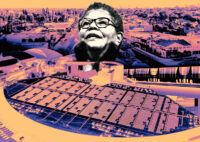This was a week to stay on top of the headlines if you’re a Los Angeles developer.
On Friday, L.A. Mayor Karen Bass issued an emergency executive order aimed at accelerating rebuilding in the Pacific Palisades by doing away with permit and plan check fees on homes destroyed or damaged by January’s wildfires. Suspending the fees is still contingent on the City Council approving an amendment on the matter, which Council member Traci Park introduced earlier this year.
Friday’s move came a few days after Bass announced executive actions addressing the Palisades’ rebuild during her State of the City address.
One order allows homeowners working with qualified architects the chance to self-certify their plans, thereby bypassing plan checks. Buildings will still have to be inspected, but the city views this as a way of alleviating at least one bottleneck.
Additionally, artificial intelligence will now be used by staff when checking that plans are in compliance with building and zoning codes in the Palisades.
If the initiatives are successful, they could be rolled out citywide, Bass said.
As of Friday, the city of Los Angeles reported 23 permits for 16 addresses issued in the Palisades.
Four LA projects to know
Sprucing up Los Angeles ahead of the 2028 Olympics and next year’s FIFA World Cup was also on this week’s State of the City agenda.
“We want people not just to see our stadiums,” Bass said during the annual address. “We want them to see the real L.A.”
To that end, Bass highlighted four key projects to know:
- Mixed-use Rams Village at Warner Center in the San Fernando Valley.
- Destination Crenshaw public art and open space initiative running alongside a portion of the Metro Rail line on Crenshaw Boulevard.
- Massive infrastructure projects to improve terminals and get a 2.25-mile Automated People Mover train running at Los Angeles International Airport.
- Making over the Los Angeles Convention Center to compete with other facilities around the state and country to attract meetings and events.
Resi beat notes
Salespeople are upbeat on Los Angeles’ luxury condo market and the numbers cut through marketing speak to support the growth storyline.
Luxury condo sales in the city spiked 59 percent year over year in the first quarter to $5.7 million, according to a report from Miller Samuel Real Estate Appraisers & Consultants for Douglas Elliman.
Meanwhile, The Agency finished selling off the last of the condos in the 59-unit Four Seasons Private Residences in Beverly Grove as the market makes way for the ultra-luxe Aman Beverly Hills project in 2027.
Elsewhere in residential industry news, Carl Gambino’s Gambino Group is growing. The Compass team is in negotiations to bring four more agents to its 22-person group. It’s also eyeing Westchester, Hudson Valley and Palm Beach for its next growth steps.
Measure ULA blamed for permit paralysis
Real estate agents and brokers have been talking up the negative impacts of Measure ULA on deals and development since voters approved it in 2022. New stats from a UCLA report offer further support on the argument.
The UCLA Lewis Center for Regional Policy Studies found that permits pulled for new multifamily projects dropped 18 percent in the first year since the ballot measure was approved. That’s 1,910 less units coming online in projects of 20 apartments or more, according to the report.
Another analysis cited Measure ULA in combination with high interest rates, tariffs, January’s wildfires and economic uncertainty for housing permits in the first quarter slipping 57 percent from the year-ago period. The analysis was done by Hilgard and found the west and northeast San Fernando Valley and South Los Angeles to be the hardest hit by the decline.
Proposed bill looks to limit CEQA
California lawmakers are considering a bill that aims to offer some developers relief from completing an environmental impact report.
Assemblymember Buffy Wicks (D-Oakland), Juan Carrillo (D-Palmdale), Heath Flora (R-Ripon), Sharon Quirk-Silva (D-La Palma) and Lori Wilson (D-Suisun City) authored Assembly Bill 609. It was introduced in February and aims to do away with EIRs for housing developments as large as 20 acres in Census Bureau-designed urban areas.
The bill would not apply to proposed projects in unincorporated parts of the state.
Read more



